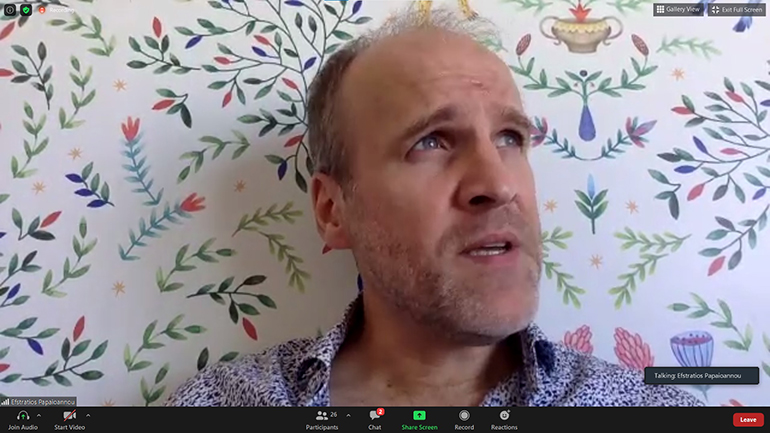Monday, September 14th 2020
The fourth day of the Annual School of Byzantine Studies began with a presentation by Dr Grigori Simeonov (University of Vienna) on the topic of Harbours on the Western Black Sea Coast from the 4th to the 13th century. Politics, Economy, and Environment in South-Eastern Europe in Late Antiquity and Middle Ages, which stressed the importance of the South-Eastern European ports and of the Danubian hinterland for the Byzantine Empire by way of a typological classification which also outlined the documentary sources cited (archaeological sources, modern urban topography, manuals on navigation, periploi, historiographic and hagiographic period texts, sigillography).
Dr Simeonov’s intervention was succeeded by that of Lecturer Gina Scarlat (“Dunărea de Jos” University of Galați), who presented the life and work of a lesser-known Greek scholar by the name of Sevastos Kiminitis, who chaired the Royal Academy in Bucharest (established by King Constantin Brâncoveanu). The presentation, titled The Activity of Sevastos Kiminitis in the Romanian Provinces („L’activité de Sevastos Kiminitis dans les Pays Roumains”) illustrated the role of encyclopaedic knowledge based on ancient Classical forms in the formation of 18th-century elites, a fortunate conjunction between the Humanities and the study of the exact sciences.
The third presentation was that of Professor Stratis Papaioannou (University of Crete) who gave a masterclass seminar, in the Byzantine style, in the form of an extended question and answer session (pros erotemena atta apokrisis) on Byzantine literature, the culture of the Book and the dissemination of knowledge and learning in the Byzantine Empire. During the seminar, titled Byzantine Literature, Language and Book Culture, the passionate and erudite discussions covered various types of texts, authors and manuscripts, strategies for creative writing and deciphering texts that have survived to the present, target audiences, literary sponsors and the changing reception of certain texts over the ages, the Byzantine educational system, religion and styles of writing. Towards the end of the seminar, the participants were given the opportunity to view illustrations of various types of Byzantine manuscripts, many of them true works of art in their own right.
In closing, Mr Dragoș Mîrșanu (Department for the Valorisation of Patristic Heritage, Metropolitan of Moldavia and Bukovina) outlined the transition between Byzantine book culture and the culture of Byzantine authors in 21st-century Romania, through an intervention titled Publishing Books on Byzantine Christianity: A Romanian Editor’s Perspective. In it, he presented different titles published by the Doxologia Press in Iași – translations of Byzantine and post-Byzantine authors, monographs and scientific works – while also highlighting the challenges with which this section of the Romanian book sector is currently faced.
Unfortunately, the lecture of Professor Alexandros Alexakis (University of Ioannina), Byzantine Hagiography Looking North, initially scheduled for Wednesday, September 16th at 10:30am will now be rescheduled to Thursday, September 17th, at 2:30pm, due to unavoidable circumstances beyond the organisers’ control. Consequently, on Wednesday the 17th the activities of the Annual School of Byzantine Studies will commence from 2pm onwards.
Dr Grigori Simeonov (University of Vienna), Harbours on the Western Black Sea Coast from the 4th to the 13th century. Politics, Economy, and Environment in South-Eastern Europe in Late Antiquity and the Middle Ages (in English)
Lecturer Gina Scarlat (Dunărea de Jos University, Galați), The Activity of Sevastos Kiminitis in the Romanian Principalities (“L’activité de Sevastos Kiminitis dans les Pays Roumains”) (in French)
Dragoș Mîrșanu (Department for the Study of Patristics, Metropolitan of Moldavia and Bucovina), Publishing Books on Christianity in Byzantium: A Romanian Editor’s Perspective (in English)












